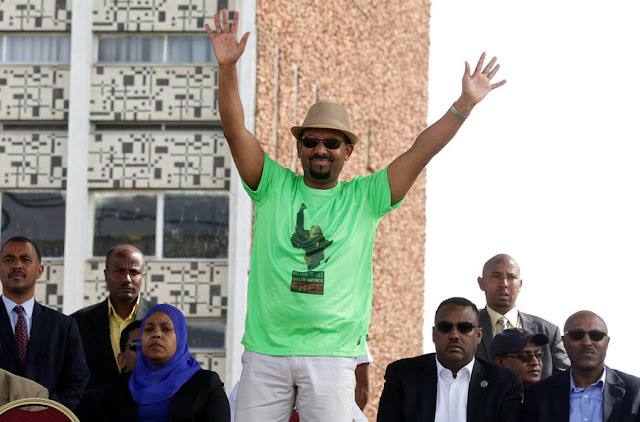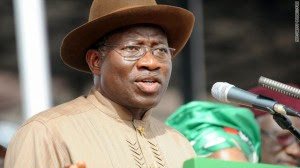Lesson from Africa’s youngest ruler
By Abdulrazaq O Hamzat

Abiy Ahmed, Ethopia prime Minister
Ethopia’s new Prime Minister, Abiy Ahmed (42), who took office in April as Africa’s youngest ruler is currently leading the world with love. He often preach, “Love wins” even when he was attacked with grenade by hostile enemies and narrowly escape death.
In June 2018 for example, csmonitor reported that, ‘’after he gave a speech to a large and adoring crowd in the capital, Addis Ababa, someone threw a grenade toward him, killing two people and injuring more than a hundred.
However, rather than respond with condemnation of attack as his usually done by most leaders across the world, Abiy simply responded with a love message that says, “Love always wins. Forgiveness will win. Killing others is a defeat.”
But this is not the first act of love and forgiveness Abiy has done since coming to office. He has been demonstrating a rare kind of love, similar to the kind of love Kanye West preaches during his recent rant on Twitter.
After taking office in April, Abiy apologized for the killing of dissidents under previous leaders.
“I ask forgiveness from the bottom of my heart for the many advocates of freedom and justice...” he said. He admitted the country is in chaos, a result mainly of several years of antigovernment protests.
He also admitted the government is tainted by corruption, pledging a crackdown and better rule of law. And he quickly tried to lift a climate of fear by releasing thousands of political prisoners and ending government blockage of opposition media. csmonitor reported.
‘’Dr. Ahmed advises people to cast away a spirit of hatred and revenge in order to end ethnic fears and resentments.
To make his point, he made a generous peace offer with neighboring Eritrea over a land dispute that led to a disastrous war two decades ago.
He dined with political opponents who had just been released from prison. And he has moved quickly to implement reforms, such as shaking up the much-feared security services and ending a state of emergency’’
As a result of Abiy’s peace move, Ethiopia and Eritrea ended a two-decade conflict with a deal that their two leaders say was based on forgiving each other for past offensess’’
A key motive, they indicated, was to offer mercy to the other side after years of conflict over a border dispute, driven in part by ethnic tensions.
“Forgiveness frees the consciousness,” said Abiy. “When we say we have reconciled, we mean we have chosen a path of forgiveness and love.”
And, he added, “Love is greater than modern weapons like tanks and missiles. Love can win hearts, and we have seen a great deal of it today here in Asmara [Eritrea’s capital].
Many Ethiopians expressed their exhilaration on social media. “The events of these past … days between Ethiopia and Eritrea are like the fall of the Berlin Wall. Only amplified 1,000 times,” Samson Haileyesus wrote on Facebook. The reaction in Eritrea has been equally ecstatic.
Analysts have stated that, Abiy’s emphasis on love as a national unifier may stem from his pedigree as peace professionals. He has a PhD in peace studies and “social capital.” His father is a Muslim from the largest ethnic group, the Oromo, while his mother is Christian from the second-largest group, Amhara.
Ahmed says a country with so many differences could bring a blessing if people listen to each other and “there understands based on principles.” He has proposed a commission to look for new ways to blend the country’s ethnicities into a larger political narrative.
Since coming to power in April, Abiy has electrified Ethiopia with his informal style, charisma and energy, earning comparisons with Nelson Mandela, Justin Trudeau, Barack Obama and Mikhail Gorbachev.
He has reshuffled his cabinet, fired a series of controversial and hitherto untouchable civil servants, including the head of Ethiopia’s prison service, lifted bans on websites and other media, freed thousands of political prisoners, ordered the partial privatisation of massive state-owned companies, ended a state of emergency imposed to quell widespread unrest and removed three opposition groups from a list of “terrorist” organisations.
So far, Ahmed has caught the imagination of Ethiopian youth. Many in Saturday’s crowd carried signs that read “One Love, One Ethiopia.” Two days after the blast, dozens of people were lining up to donate blood for the wounded. It was another example of love winning.
The lesson from Africa's youngest ruler is very clear and simple, ''love and forgiveness wins''.
Abdulrazaq O Hamzat is a lead researcher for Nigeria Peace Index (NPI) and an Executive Director at Foundation for Peace Professionals (FPP) Discus4now@gmail.com

Abiy Ahmed, Ethopia prime Minister
Ethopia’s new Prime Minister, Abiy Ahmed (42), who took office in April as Africa’s youngest ruler is currently leading the world with love. He often preach, “Love wins” even when he was attacked with grenade by hostile enemies and narrowly escape death.
In June 2018 for example, csmonitor reported that, ‘’after he gave a speech to a large and adoring crowd in the capital, Addis Ababa, someone threw a grenade toward him, killing two people and injuring more than a hundred.
However, rather than respond with condemnation of attack as his usually done by most leaders across the world, Abiy simply responded with a love message that says, “Love always wins. Forgiveness will win. Killing others is a defeat.”
But this is not the first act of love and forgiveness Abiy has done since coming to office. He has been demonstrating a rare kind of love, similar to the kind of love Kanye West preaches during his recent rant on Twitter.
After taking office in April, Abiy apologized for the killing of dissidents under previous leaders.
“I ask forgiveness from the bottom of my heart for the many advocates of freedom and justice...” he said. He admitted the country is in chaos, a result mainly of several years of antigovernment protests.
He also admitted the government is tainted by corruption, pledging a crackdown and better rule of law. And he quickly tried to lift a climate of fear by releasing thousands of political prisoners and ending government blockage of opposition media. csmonitor reported.
‘’Dr. Ahmed advises people to cast away a spirit of hatred and revenge in order to end ethnic fears and resentments.
To make his point, he made a generous peace offer with neighboring Eritrea over a land dispute that led to a disastrous war two decades ago.
He dined with political opponents who had just been released from prison. And he has moved quickly to implement reforms, such as shaking up the much-feared security services and ending a state of emergency’’
As a result of Abiy’s peace move, Ethiopia and Eritrea ended a two-decade conflict with a deal that their two leaders say was based on forgiving each other for past offensess’’
A key motive, they indicated, was to offer mercy to the other side after years of conflict over a border dispute, driven in part by ethnic tensions.
“Forgiveness frees the consciousness,” said Abiy. “When we say we have reconciled, we mean we have chosen a path of forgiveness and love.”
And, he added, “Love is greater than modern weapons like tanks and missiles. Love can win hearts, and we have seen a great deal of it today here in Asmara [Eritrea’s capital].
Many Ethiopians expressed their exhilaration on social media. “The events of these past … days between Ethiopia and Eritrea are like the fall of the Berlin Wall. Only amplified 1,000 times,” Samson Haileyesus wrote on Facebook. The reaction in Eritrea has been equally ecstatic.
Analysts have stated that, Abiy’s emphasis on love as a national unifier may stem from his pedigree as peace professionals. He has a PhD in peace studies and “social capital.” His father is a Muslim from the largest ethnic group, the Oromo, while his mother is Christian from the second-largest group, Amhara.
Ahmed says a country with so many differences could bring a blessing if people listen to each other and “there understands based on principles.” He has proposed a commission to look for new ways to blend the country’s ethnicities into a larger political narrative.
Since coming to power in April, Abiy has electrified Ethiopia with his informal style, charisma and energy, earning comparisons with Nelson Mandela, Justin Trudeau, Barack Obama and Mikhail Gorbachev.
He has reshuffled his cabinet, fired a series of controversial and hitherto untouchable civil servants, including the head of Ethiopia’s prison service, lifted bans on websites and other media, freed thousands of political prisoners, ordered the partial privatisation of massive state-owned companies, ended a state of emergency imposed to quell widespread unrest and removed three opposition groups from a list of “terrorist” organisations.
So far, Ahmed has caught the imagination of Ethiopian youth. Many in Saturday’s crowd carried signs that read “One Love, One Ethiopia.” Two days after the blast, dozens of people were lining up to donate blood for the wounded. It was another example of love winning.
The lesson from Africa's youngest ruler is very clear and simple, ''love and forgiveness wins''.
Abdulrazaq O Hamzat is a lead researcher for Nigeria Peace Index (NPI) and an Executive Director at Foundation for Peace Professionals (FPP) Discus4now@gmail.com





Comments
Post a Comment